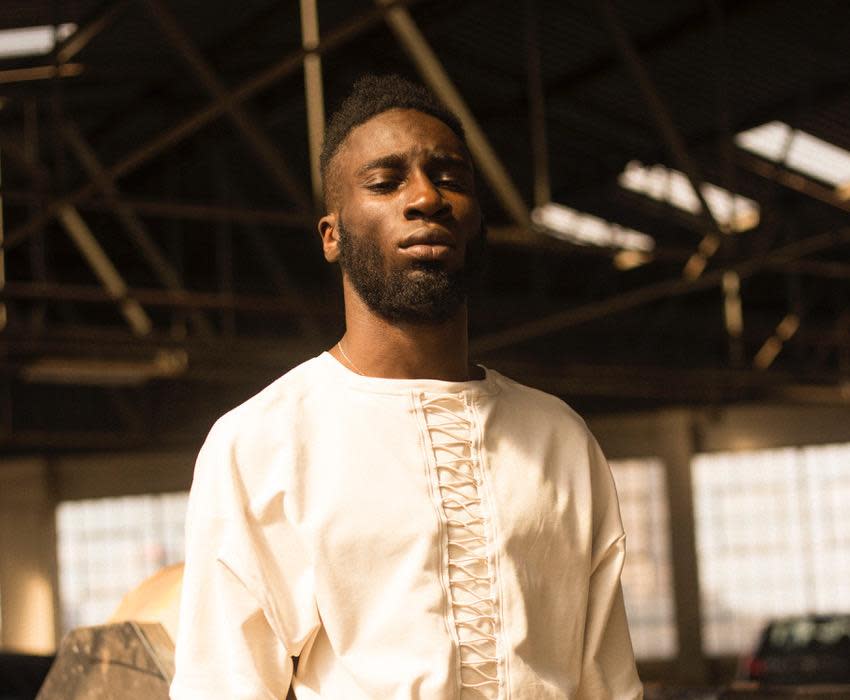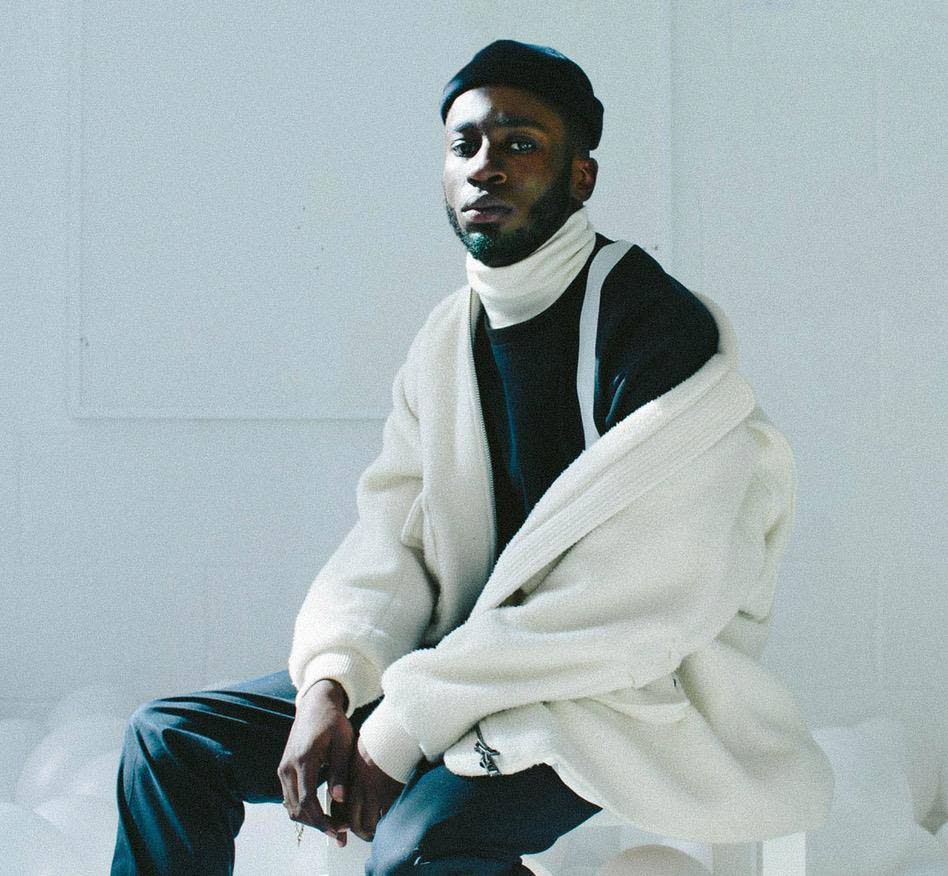Kojey Radical is the renaissance man

Kojey Radical still freaks out when someone tells him they’ve heard his music.
Impeccably dressed, with a metal bicycle chain around his neck, the 25-year-old Hoxton native has ventured out of his comfort zone (literally – he’s not keen on areas outside of east London) to a pub in Kensington, where he explains how he ended up recording his latest track – “Water” – with Birmingham-based R&B singer Mahalia.
The song opens with the rushing sound of a stream and a woozy, Thundercat-esque guitar line before Radical bursts in with those arresting, husky vocals; a bright sequence on the keys darts over the top, and Mahalia completes the mood with a sweet yet sharp-tongued interval.
“Anytime anyone tells me they heard one of my songs I freak out a bit,” Radical – real name Kwadwo Adu Genfi Amponsah - says. ”You know the fun thing about releasing music this year is that it feels so pressure free; I’m more excited to see what people feel when they hear the music. I wanna ask: ‘And what was your experience?’ and take out a little clipboard or something.”
He’s glad for his story about meeting Mahalia, suggesting some collaborations in music can feel contrived. Working with the producer Swindle, whom he met in Russia, he heard an instrumental and ended up singing over it – one of the earlier instances of “more tonal stuff – rather than rapping”. The pair reached a point where a writer called Eva Lazarus penned a section for him, and he decided he needed a female presence on the record.
“Then I met May’s mum at Afropunk,” he says, smiling at the memory. “She’s the best soul, the most vibrant woman in the room, all the time. We just started chatting, and eventually she says, ‘you’d like my daughter’. I ended up connected with May, so the whole thing felt like some kind of arranged…” he breaks off with a laugh.
Once he sent the track over, Mahalia replied within an hour and asked to record it with him – from there, as artists, they clicked, and Radical says he hopes they’ll end up working on more music in the future.
Music wasn’t his first choice, he says, but more something he fell into, and in love with. “Art is a completely different world, you’re allowed to be in your own space,” he says.
His last project, the EP In God’s Body, was an incredibly ambitious work that offered up the concept of a feminised utopia where God was voiced by Chewing Gum creator Michaela Coel, and in which Radical turned the focus on themes of female power, origin stories and his own masculinity; incorporating elements of old-school hip hop, jazz, soul, gospel, punk poetry and electronic music.
“The themes in In God’s Body were so complicated… that was like my Da Vinci Code or something,” Radical laughs. ”It was complicated because I was scared of openly approaching the subject matter. That was the first time I felt my voice wasn’t as relevant, and I wanted to speak on the subject so I gave myself a different voice.
“That whole project was a year of self-discovery, and every moment I discovered something about myself came from the actions or presence of women. Every strength I’m supposed to see in myself as a man, I saw 10 times more in women, and I couldn’t articulate that, so I tried to put it in the music. ‘Super Human’ was originally written with me talking, but I felt like if I got a woman’s voice to read it, it would complete things.”
He nods at the comparison to how US artist Rapsody explored similar themes of female omnipotence in her latest album Laila’s Wisom, only from her own perspective as a black woman.
“I always say I’m regular, and I don’t even know what that means,” Radical says. ”I see life as it is, so things I would love to be able to talk about… I can’t, because I don’t have those experiences. I wanted to explore these moments and difficult situations and the ways we overcome them. Certain things I wanted to get into came with this fear, and this year I don’t really feel that any more.”

Timing-wise, the release of In God’s Body couldn’t have been more perfect, but was entirely unintentional, he continues. Work on the project began in 2016, before the Time’s Up and #MeToo conversations got underway. But that’s just how Radical works, he says. He doesn’t go looking for ideas; rather he lets them find him.
“Some things just follow you, and the only way to shake it off is to speak about it,” he says. ”So that’s what I’m doing, and there’s gonna be a point where I sit down and realise that’s the theme. Eventually I’m gonna do ‘Avengers Assemble’ with people in a writing camp – Swindle, ShyFX, New Machine, Jonah Christian, Ray BLK – and make the best album anyone’s ever seen… and then I’m gonna get snubbed by the Mercury’s,” he predicts with a chuckle. ”Now they have to give me one, right?”
Many critics have attempted to lump him into one category – that of the “socially conscious rapper” – which he seems quite keen to resist, because it limits any future themes that might happen to find him.
“It’s petrifying when you have to be a political rapper,” he says. “Sometimes I go to write something that to me is not political, and then I put it out and people interpret it that way because of what I’ve done before. We live in this world where everything has to be categorised.
“You can fight the global powers, they need fighting,” he adds. ”Or you can plant seeds that make a difference in your community. But if you take down one bad guy, there’s another one to take their place. The problems they created on a smaller scale, that’s what needs taking care of.”
Radical lost his best friend at the beginning of this year, but says his situation was separate to the issues being pinned on the current spate of street violence in London, and dismissing the “tabloid” claim that it’s somehow a new phenomenon, rather than an issue that has been ongoing for decades, but has only recently been deigned important enough for the eyes of middle class Britain.
Similarly with Donald Trump, Radical wants the media to stop putting a spotlight on ignorance, so rather than join the embarrassingly over-enthusiastic chorus of approval for Eminem – whose current career seems to entail poking the US president with a stick, to no response – he applauds Stormzy, who gave UK prime minister Theresa May the briefest of mentions, with devastating effect.
“What Stormzy did at the Brits, that was amazing,” he says. ”That’s how to do it. It wasn’t a four minute freestyle going at her, it was one line. Like, ‘We know what you did’. He gave her one line and took over the conversation. And the next day, things started happening.”

Along with his own music, Radical is determined to lift up his contemporaries, and so in April he hosted “Endless”, a night of live music hosted by him at the Jazz Cafe in London. The event sold out, despite promoters telling him it wouldn’t: “The suits decide what sells, like at festivals, but then they’re walking around in their shorts and flip flops and they say ‘who’s that guy with the biggest crowd’ and I’ll say ‘that’s my guy off the Kensington estate or something’,” he declares.
“The basis of grime, the basis of hip hop, the basis of most of our music, is that it’s DIY. If it started in the basement, keep it in the basement, you know what I mean? I write my lyrics in my bedroom, unless I’m in a session and I freestyle it.
“There’s not a blueprint to making art. It’s why, despite the fact you might pay your life expectancy in uni fees, while you’re doing the course they’re reminding you that you might not make it. That was the thing that f**ked me off the most. They were reminding you that fewer job opportunities exist… and you’ve gotta pay for that.”
Radical studied at the London College of Fashion where he graduated in the top 6 of his class, but it sounds as though the course was more a means to an end where he emerged on the other side clutching that “piece of paper” he needed.
“Everything I learned doing art and illustration helped me in my music – being able to break things down, I learned that during my education,” he says. ”But that’s because I absorbed the knowledge and information I wanted to take away for myself. It’s the same thing with my music, coming in with poetry, being “genre-less”, everyone said it was not going to work.”
For the rest of this year, he’s “keeping things cool”. There might be a short film, more songs, festivals, fashion work (”my mum needs every handbag” he says, cracking up), more gigs... “this is a free-flow, this year,” he says again, decisively. “I’m doing what I want.”
‘Water’, the new single from Kojey Radical with Mahalia, is out now

 Yahoo News
Yahoo News 